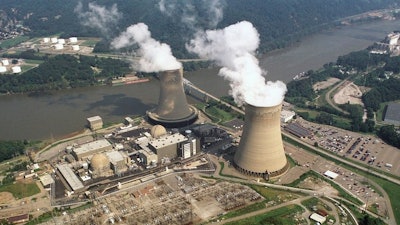
OREGON, Ohio (AP) — Gov. John Kasich said Monday that he can't see supporting a proposed financial rescue that FirstEnergy Corp. maintains is needed to keep alive the state's two aging nuclear plants.
He said it's up to the utility to figure out how to keep its nuclear plants operating without a state-approved bailout.
Akron-based FirstEnergy wants Ohio lawmakers to sign off on an electricity rate increase for its customers to save the Davis-Besse and Perry plants, which sit along Lake Erie and produce 14 percent of the state's electricity.
The plants are vital to the rural towns where they're located and generate millions in tax money for schools and local governments. But like many nuclear plants around the nation, both Davis-Besse and Perry are aging, costly to operate and maintain, and face stiff competition from cheaper natural gas plants.
Kasich on Monday toured a new $800 million natural gas plant near Toledo that can produce enough electricity for 700,000 homes — more power than one of the nuclear plants can make.
"It's bringing investment, competition and, most important, lower prices for consumers," Kasich said at the plant's opening.
The governor said he hopes lawmakers understand that. "There's always a tendency to slip back into yesterday. This represents tomorrow," the Republican governor said.
A proposal that could lead to $300 million a year in new charges for FirstEnergy customers in order to help out the nuclear plants has been stalled in the Legislature since late spring.
Under the plan, FirstEnergy's average residential customer would pay about $5 more per month, while businesses and factories would see much larger increases if lawmakers OK the bailout.
Kasich said all forms of energy — wind, solar, coal, natural gas and nuclear — should be a part of the mix, and he added that limiting government regulation will spur investment by industries and create new jobs.
Peter Rigney, who oversaw construction of the natural gas plant in suburban Toledo, said there are more plants like it on the drawing board in Ohio, if the state legislature does not approve financial help for FirstEnergy.






















